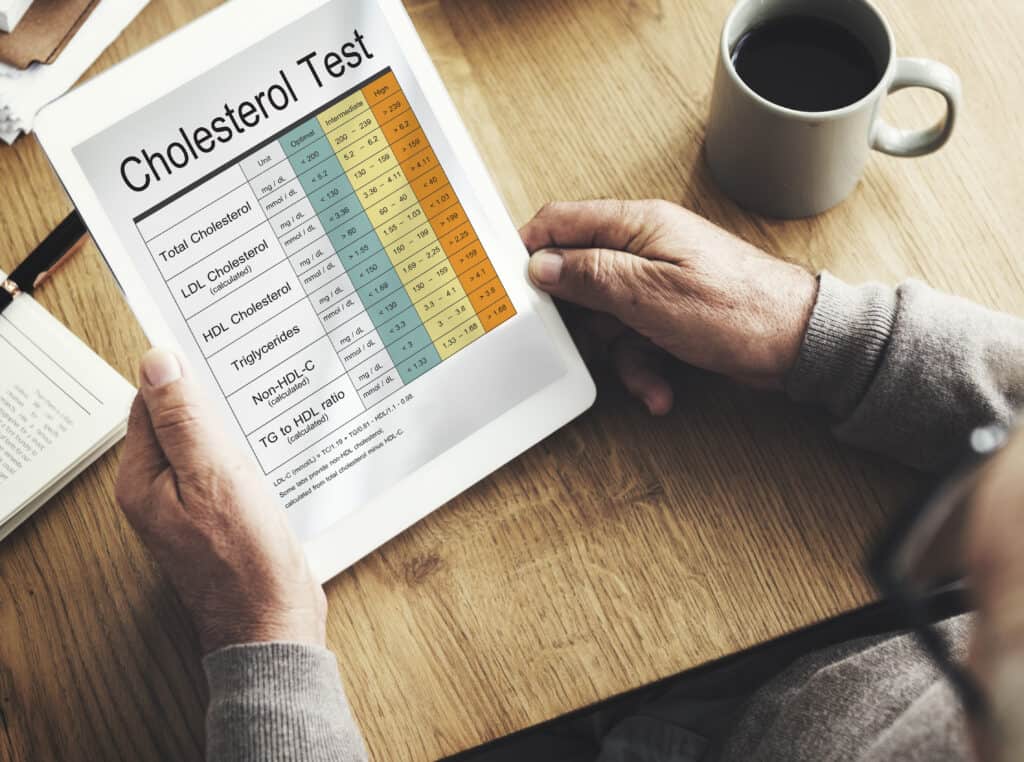Our bodies need healthy levels of cholesterol to function. Cholesterol is a fatty substance made by the liver and distributed throughout the body. It allows our bodies to make vitamin D and hormones, and makes up bile acids. We also get less than 25 percent of our body’s cholesterol from the foods we eat, especially animal fats.
High cholesterol means you have a lot more cholesterol in your blood than you need. Most people who have high cholesterol don’t have any obvious symptoms. A simple blood test can tell you if you have high cholesterol. If you do have high cholesterol, dietary changes, exercise, and targeted medications can help lower it and reduce your risk of developing heart disease.
Circulatory System
Cholesterol moves through your bloodstream via lipoproteins. There are two kinds of lipoproteins, and we need them both. Low-density lipoproteins (LDL) transport cholesterol around to where it’s needed. LDL is commonly referred to as “bad cholesterol.” High-density lipoproteins (HDL) take the extra cholesterol from your tissues and cells and return it to your liver for repurposing.
The job of the arteries is to move blood from your heart to other parts of your body. Too much LDL and not enough HDL makes it more likely that your arteries will develop plaque, a hardened mixture of cholesterol, fat, and other elements.
Blood Supply
As coronary arteries narrow, it’s harder for blood to make it through to your heart. If an area of plaque breaks open, it can result in a blood clot, which can block blood flow altogether. This puts you at great risk of having a heart attack. Symptoms of reduced blood supply to the heart include chest discomfort, pressure, and pain (angina). You may also have pain in your jaw, neck, shoulders, arms, or back.
Plaque Can Kill
When plaque builds up in the arteries your brain is deprived of oxygen. Brain cells quickly become damaged and start to die (stroke). Symptoms include sudden weakness and numbness. Depending on the area of the brain involved, you may have trouble speaking, seeing, or moving your limbs. A stroke can cause brain damage, disability, or death.
Plaque can also build up and interfere with blood flow to your arms and legs (peripheral arterial disease). There’s an increased risk of infection in those limbs. Lack of blood can cause tissue death (gangrene).
Digestive System
High cholesterol can create a bile imbalance, leading to gallstones. According to the National Digestive Disease Information Clearinghouse, more than 80 percent of gallstones are cholesterol stones. A buildup of plaque in your arteries can also block blood flow to your kidneys and stomach. Intestinal ischemic syndrome is when there’s a blockage in arteries leading to the intestines or bowel. Symptoms include abdominal pain, nausea, vomiting, and bloody stools.
Final Thoughts
This article discussed a few points to be aware of. We know that someone can’t change family history and genes, but they can change how much they eat and exercise. Research has demonstrated that these can combat rising cholesterol.
Try the Jefit App
Jefit, named best strength training app for 2022 by MUO, BYRDIE and ORIGYM, has a community that’s responsible for 92,000,000 workouts to date! The app, which recently passed 10 million downloads, comes equipped with a customizable workout planner and training log. The app has ability to track data, offer audio coaching cues, and can share workouts with friends. Take advantage of Jefit’s exercise database for your strength workouts. Visit our members-only Facebook group. Connect with like-minded people, share tips, and advice to help get closer to reaching your fitness goals. Stay strong with Jefit.
- Boost Your Posterior Strength with 3 Effective Jefit Exercises - March 31, 2025
- 8 Underrated Stretches to Improve Your Deadlift Performance - March 28, 2025
- Strength vs. Hypertrophy: Best Way to Train for Your Goals - March 26, 2025
